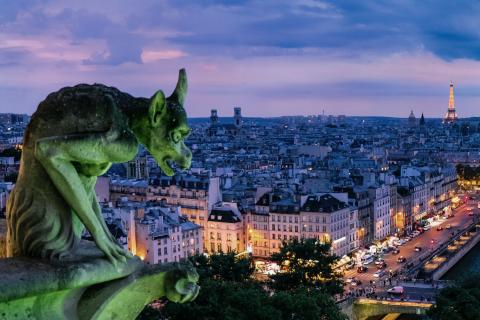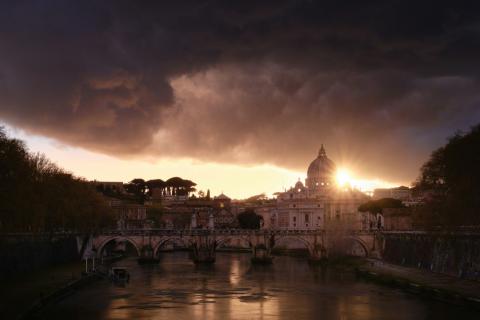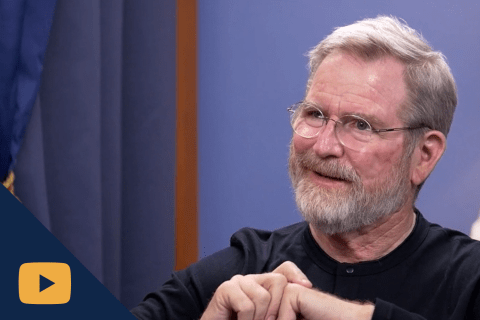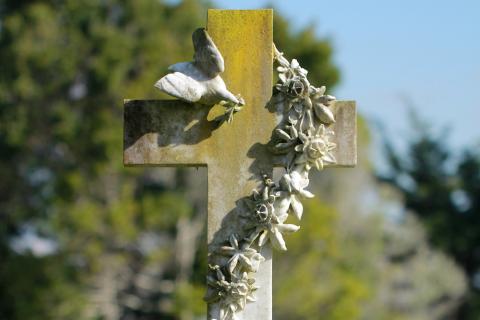
The following text is drawn from "Naming the New Lions: The Challenges of Contemporary Culture to Christian Faith," found in Renewal of Catholic Higher Education: Essays in Catholic Studies in Honor of Don J. Briel, published by the University of Mary in 2017. This article serves as the third in a series of four, beginning with "Naming the New Lions."
Years ago my old spiritual director alerted me to the fact that when, with my index finger, I am pointing at something or someone—when I am naming them—I am with that same gesture, with three of my other fingers, pointing back at myself! It was, I’m sure, a needed, salutary lesson at the time, and one that is also worth remembering here as I continue attempting in this series to name, one after the other, the new lions. For the inescapable fact is that there are lions prowling within ourselves as well as lions outside. “Within the heart,” we read in the homilies of St. Macarius, “there are unfathomable depths… It is but a small vessel, and yet there are… lions there.”1
The phenomenon on which I now want to focus attention I call the lion of fundamentalism. It may strike you, at first, as a surprising choice. We don’t normally consider fundamentalism a particular problem for Catholics. We associate it more with extreme forms of Islam or, in this country, with certain hard-line branches of the Reform tradition. And we point the finger in those directions. But if we examine our conscience and our history on the matter, we begin to realize that, at least as a tendency, fundamentalism has been with us in the Church almost from the beginning. The first fundamentalists, in fact, it could be argued, included some of the earliest followers of Jesus—all of them Jews—who rejected outright the idea of accepting non-Jews, the Gentiles, into the communion of Christ’s Church. These Jewish converts were genuinely sincere men and women, people of principle, holding fast to what they understood and accepted as God’s will. But on one crucial issue, their minds and hearts were closed all the same.
Something of St. Paul’s exasperation in trying to come to terms with this phenomenon in the early Church is echoed three centuries later in a completely different context by St. Augustine. The group Augustine sets out to address is clearly resolute in its adherence to a number of the teachings of the Gospel. But in classic fundamentalist spirit, they somehow manage to ignore all the rest of God’s truth. Augustine writes: “The clouds of heaven thunder forth throughout the world that God’s house is being built. But these frogs sit in their pond and croak: ‘We’re the only Christians’!”2
Unfortunately, something of that “croaking” noise has survived the centuries and can still be heard today in a number of voices and ideologies within the Church. Hans Urs von Balthasar, although delighted at the emergence within Europe of a number of small groups determined to return to the fundamentals of the Catholic faith, found it necessary, at the same time, to warn them about the risk of a Catholic fundamentalism—a phenomenon he described as “the temptation of an enclosed autonomy.”3
Von Balthasar spoke of two temptations. The first temptation, he said, is “to be too involved in the world.” The second is the temptation to draw back from our social and political responsibilities and inhabit what Balthasar calls “an enclosed autonomy.”
The witness to Gospel truth and to Catholic life such groups could give was, he said, “the Church’s greatest need,” but it was also “a great danger.”4 In spite of their enormous potential, there existed, in these groups, a tendency toward a sort of sectarian pride, a group arrogance or group narcissism. He wrote: “After the humbling of hierarchical triumphalism, there still remains a more subtle, spiritual triumphalism, the triumphalism found in the ideology of communities or groups… On the one hand, there is the temptation to be too involved in the world; on the other hand, there is the temptation of an enclosed autonomy. The only solution is openness to God’s revelation in its unabbreviated Catholicity.”5
The emergence of Catholic Studies Programs is, I am persuaded, a phenomenon that would have delighted Hans Urs von Balthasar. I say this because it represents, first and last, a return to the fundamentals of the Catholic faith. But what of the threat to which he drew attention, namely the lion of fundamentalism? What of the temptation to group arrogance and group narcissism, the temptation, that is, to fall back into the safety of an enclosed autonomy? In my own experience of Catholic Studies—an experience that stretches back several years—I never witnessed, not even once, the unhappy phenomenon Balthasar describes, the descent into an elitist spiritual triumphalism. On the contrary, what has impressed me, again and again, in both the students and professors in the Catholic Studies Program is the way strong conviction concerning the fundamentals of the faith combines with an impressive openness of spirit and with a joy—both natural and supernatural—clearly manifesting the very opposite of a grim fundamentalism. What’s more, the phenomenon I’ve been describing can, I have no doubt in my mind, be directly attributed to the “unabbreviated Catholicity” of Dr. Briel’s original vision.
One of the temptations to which Balthasar refers is “the temptation to be too involved in the world.” With regard to the priesthood, that particular temptation is linked, perhaps forever in our minds, with the period immediately following Vatican II. At that time, the secular dimension of the priestly vocation was emphasized. The calling of the priest, his very identity, seemed at times almost to coalesce with the aims of people like social workers and politicians, who were trying to transform human culture by promoting peace and justice in the world, the alleviation of poverty, health care and other works of mercy. The problem for the priest, however, the risk, was in allowing these great and necessary tasks to obscure something fundamental to the vocation of the ministerial priest, namely the sacred and cultic character of his role. Naturally, I don’t think we should ever separate priesthood from an active concern for the poor or for the downtrodden, a Gospel imperative articulated brilliantly in our own day by Pope Francis. However, I have been greatly impressed and encouraged, over recent years, by the manifest recovery among young Catholics and young Catholic seminarians of the understanding of the sacred role of the priest.
Von Balthasar spoke of two temptations. The first temptation, he said, is “to be too involved in the world.” The second is the temptation to draw back from our social and political responsibilities and inhabit what Balthasar calls “an enclosed autonomy.” Those who follow this route, whether they are priests, seminarians or laypeople, are very often sincere men and women, deeply passionate about their faith and their convictions. But being so intent on holding fast to these convictions, they can become somehow rigid and hard-nosed and begin to treat the faith as if it were their own personal and tribal possession.
We are called, as Catholics, to be “carriers of the Word of life.” But if, in practice, all we carry around in our minds or express with our words is a harsh fundamentalist creed or a hard-line ideology—a so-called left-wing or right-wing ideology—then we will never begin to transform the culture of the world we live in.
“Sometimes,” Pope John Paul II remarked, addressing a group of young seminarians, “priests of excellent virtue and zeal drastically reduce the efficacy of their ministry because of their impatient, unfriendly temperament and lack of balance. It is necessary, therefore, to form for oneself a good, open, understanding, patient character.”6 If nowadays, as priests or laypeople, we should find ourselves guilty of what John Paul calls “lack of balance,” if we allow ourselves, that is, to be taken over by some kind of spiritual fundamentalism, it will mean that the door has finally been closed on any serious attempt at evangelization.
We are called, as Catholics, to be “carriers of the Word of life.” But if, in practice, all we carry around in our minds or express with our words is a harsh fundamentalist creed or a hard-line ideology—a so-called left-wing or right-wing ideology—then we will never begin to transform the culture of the world we live in. And why? Because what we will be preaching will be our own word, and not the Word of God. The Dominican preacher Vincent McNabb remarked once to his brethren in the English province: “The world is waiting for those who love it … If you don’t love men don’t preach to them—preach to yourself”!7
When I spoke earlier about the lion of relativism, I suggested that we stand up to it “strong in faith.” But what answer can we give to this second lion, which threatens us both from outside and from within, the lion of fundamentalism? We have to confront it, obviously, and head-on; we have to give an answer to those who question our faith. “Put in my mouth,” we read in the Book of Esther, “persuasive words in the presence of the lion” (Esther 4:24). That said, however, the best response to fundamentalism, the most compelling and effective answer, but an answer that might, at first, look weak and ineffective is, of course, love.
Hans Urs von Balthasar, in a late interview on the subject of faith and modern culture, suggested that far from withdrawing from the complications and confusions of modern society and modern culture, the Christian should be active “on all levels on which a Christian commitment can humanize whatever is threatening to slide into the inhuman.”8 Earlier in the interview, Balthasar put this question to himself: “What can be done amid this want of culture wrought by the machine?” And he replied: “I suppose one can try to build islands of humanity, and in this project Christians could and should be leading… From islands like this, true culture, Christian culture, may spread across the earth.”9
We are not, of course, to forget our own spiritual needs, but we are asked by the Gospel to lift our gaze away from ourselves and consider the needs of the world. Apologetics has been recovered recently by many young Catholics as a means of confronting the present crisis. That recovery has been long overdue. But as Catholics, our best apologetics, I would suggest, is the love we show to the poor, and of course the love we show to our Risen Brother and Lord in the Eucharist, and in the other sacraments as well. Love, then—God’s love for us in Christ and our love for one another—is the best way to overcome the present crisis.
1 Pseudo-Macarius, The Fifty Spiritual Homilies, 15:32; 43:7, ed. G.A. Maloney (Mahwah, NJ: Paulist Press, 1992), xvi.
2 St. Augustine of Hippo, Expositions on the Psalms, in Nicene and Post-Nicene Fathers, First Series, vol. 8, ed. Philip Schaff, trans. J.E. Tweed (Buffalo, NY: Christian Literature Publishing, 1988), Psalm 96: 11.
3 Hans Urs von Balthasar, cited in Peter Henrici S.J., “Hans Urs von Balthasar: A Sketch of His Life,” in Hans Urs von Balthasar: His Life and Work, ed. D.L. Schindler (San Francisco: Ignatius Press, 1991), 41.
4 Ibid., 40.
5 Ibid., 40-41.
6 John Paul II, “Homily of John Paul II: Mass for the Pupils of the Major Seminary of Rome,” Vatican Web site, October 13, 1979, §3.
7 Spoken by McNabb during a retreat in 1927. See Father Vincent McNabb O.P., An Old Apostle Speaks, ed. G. Vann (Oxford: Blackfriars Publications, 1946), 3.
8 Test Everything: Hold Fast to What Is Good: An Interview with Hans Urs von Balthasar by Angelo Scola, trans. M. Shrady (San Francisco: Ignatius Press, 1989), 52.
9 Ibid., 50-51.

Next: The Lion of Pessimism
The lion of pessimism – of fatigue and disenchantment – is to be opposed by the extravagant hope of Christianity.

Previous: The Lion of Relativism
The lion of relativism wraps itself in seemingly sane and humane wording, hiding its deadly tendency to draw away the lifeblood of strong religious conviction.


